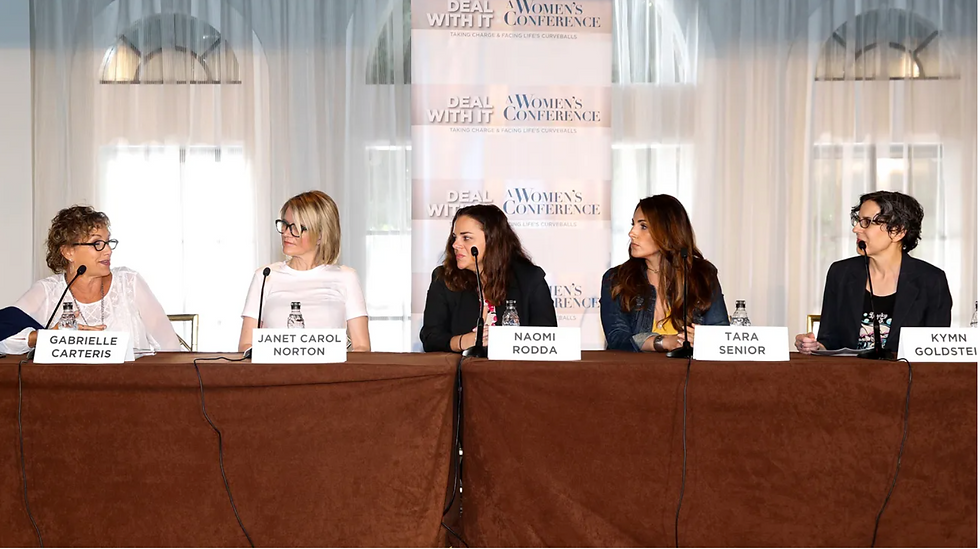SAG-AFTRA President on Making #MeToo and Time’s Up a “Watershed Moment”
- Kymn Goldstein

- Jun 16, 2024
- 4 min read

At MPTF's Deal With It: A Women’s Conference on Sunday, panelists from "Where Do We Go From Here?" talked gender equity, women empowerment and how to keep the conversation going.
When Allied Global Marketing COO Kymn Goldstein told people she was moderating a panel on the #MeToo and Time’s Up movements, she received eye-rolls from both men and women in response. That moment, which Goldstein described as “surprising and concerning,” became the backbone of Sunday’s “Where Do We Go From Here?” panel — a discussion centered around the impact these movements have had, and how to keep their momentum going.
Just 10 months after the Harvey Weinstein scandal ignited an industry-wide movement for gender equity and safety in the workplace, the Motion Picture and Television Fund (MPTF) hosted its sixth annual Deal With It: A Women’s Conference on Sunday. Over 300 women gathered at the Beverly Wilshire Hotel in Beverly Hills and listened to various panels designed to educate and empower attendees on navigating life’s toughest challenges.
“Where Do We Go From Here?” featured SAG-AFTRA president Gabrielle Carteris; Janet Carol Norton, co-head of the TV production department at ICM Partners; MPTF director of community social services Naomi Rodda; and entertainment attorney Tara Senior, a partner at Del Shaw, as panelists to discuss a topic that has dominated headlines since its initial emergence almost a year ago.
A key point that all the women onstage seemed to emphasize throughout the hourlong panel was the importance of keeping the conversation going, despite pushback from occasional “eye-rollers” or those who have become “exhausted by the discussion.”
“In order for this to be a watershed moment, we have to create a conversation and turn it into action,” urged Carteris, who suggested specific actions be enforced, such as legislation and codes of conduct, to ensure safety in the workplace. Carteris also currently serves as a founding ambassador of ReFrame, an industry-wide campaign which furthers gender parity. “Our window of opportunity is shrinking rapidly. We have to set certain standards up right now and create that change. Otherwise, we will be another moment that we recall in history,” she said.
Added Norton: “I feel like the people who do feel comfortable talking about it need to keep talking about it, and create community around it and create opportunity for people to feel comfortable.”
Another big issue that the panelists touched upon was their male co-workers’ newly hesitant behaviors. Following the Weinstein scandal, many of the panelists’ male colleagues admitted to behavior uncertainty, for fear of possibly being called out. Rodda shared an anecdote with the female audience about attending a business party with her male co-workers — many of whom she had known for years. While telling the story, she explained the importance of clear and honest discussions with male allies.
“They were like, ‘I don’t know if I can hug you. Should I shake your hand? What should I do?'” Rodda recalled to the audience. “I said, ‘I’m me, I haven’t changed. So if it was OK to hug me four months ago, it’s OK to hug me now.”
She continued: “There is a continuum that we all fall on but if we, as women, don’t tell the good men that are our allies what is OK and what is not, then we perpetuate their feeling afraid and their walking on eggshells and potentially making a mistake because they don’t know what’s OK and what’s not.”
Given the recent events around CBS CEO Leslie Moonves, it came as a surprise that the panelists strayed from this topic — though, one audience member did ask a question regarding the executive’s sexual assault allegations during the Q&A session. In response, panelists provided suggestions of how to navigate these difficult conversations with colleagues, while also discussing need for more gender equality — demonstrated by the 50/50 by 2020 plan — “deliberate mentorship” and women empowerment.
In conjunction with the Time’s Up Movement, the 50/50 by 2020 plan was initiated in order to have full gender equality in the workplace by the year 2020. Many agencies, including ICM Partners, CAA and UTA, have all pledged to join the cause. But putting women into leadership roles has proved to be a slow-going challenge for years — one that is often perpetuated by women themselves.
“Women are traditionally in competition with one another and that’s partly because [in a company] there’s one spot for a woman,” explained Senior, urging for equal representation and woman-to-woman empowerment and advocacy. Her statement elicited audible agreement from the crowd. “We’re always fighting for those one or two spots. So instead, women are keeping each other down so that we [ourselves] can rise up.”
Added Norton: “We have to be deliberate mentors and keep talking about this and explain that we all have our own barometers of what makes us comfortable; we’re not all the same. There needs to be a clear path in every company about what to do if you’re not feeling comfortable. And understand what it is you have to do if someone comes to you.”
Despite the conversation leaning heavily toward women, the panelists acknowledged how both movements did not strictly adhere to one gender and urged for a communal safe space that men and women could speak up, learn more and move forward.
“[It is] really scary to talk about this stuff and I think now, men and women feel paralyzed,” explained Senior. “Creating that safe space for both men and women … to really be able to speak about it and get the message out. That’s how we’re gonna learn what the next steps are and where we go from here.”



Comments